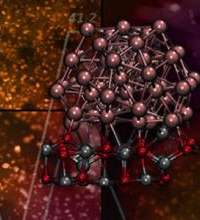Iridium nanoparticles resist deactivation in biofuel production

Steam reforming turns methane from biomass into a mixture that can be further converted into transportation fuels. By combining experimental and theoretical approaches, researchers at the Pacific Northwest National Laboratory (PNNL) Institute for Integrated Catalysis determined key properties of potentially more durable rhodium and iridium catalysts, which drive the reactions. Catalysts that quickly fail because of high temperatures and tar buildup are not practical for large-scale steam reforming production. Small iridium particles proved fast and stable.
By providing an enhanced understanding of the performance of rhodium- and iridium-based steam methane reforming (SMR) catalysts, this study paves the way for better characterizing and optimally screening potential catalysts for steam reforming methane and other hydrocarbons. Ultimately, findings will lead to selecting and developing high-performing SMR catalysts.
The researchers investigated the performance of a series of noble metal SMR catalysts supported on spinel magnesium aluminum oxide, a specific support in catalytic reactions for steam reforming. The team found that rhodium and iridium catalysts displayed the best combination of high SMR activity and favorable stability in the presence of simulated biomass—derived syngas-a fuel gas mixture primarily of hydrogen and carbon monoxide—which can be further converted to transportation fuels and other useful chemicals. Scanning transmission electron microscopy images showed rhodium and iridium nanoclusters formed and stabilized on the support at high temperatures and in the presence of steam. These highly dispersed nanoparticles showed excellent activity for methane steam reforming in the presence of tars.
Moreover, theoretical modeling revealed the small rhodium and iridium particles bind strongly to the support surface and activate both water and methane more effectively than larger particles. These catalysts resisted deactivation through sintering—the process by which particles segregate into larger inactive particles, especially at high temperatures. In addition, the iridium catalyst resisted deactivation through carbon deposition and was more active than the counterpart rhodium catalyst for SMR.
Taken together, the findings suggest the supported iridium SMR catalysts could potentially replace nickel-based catalysts, which are highly susceptible to deactivation from carbon deposition and sintering.
The researchers are continuing to delve into the properties and behaviors of catalysts for SMR and other reactions that can change our nation's energy landscape.
More information: Mei D, VA Glezakou, V Lebarbier, L Kovarik, H Wan, KO Albrecht, M Gerber, R Rousseau, and RA Dagle. 2014. "Highly Active and Stable MgAl2O4-Supported Rh and Ir Catalysts for Methane Steam Reforming: A Combined Experimental and Theoretical Study." Journal of Catalysis 316(July 2014):11-23. DOI: 10.1016/j.jcat.2014.04.021
Provided by Pacific Northwest National Laboratory



















